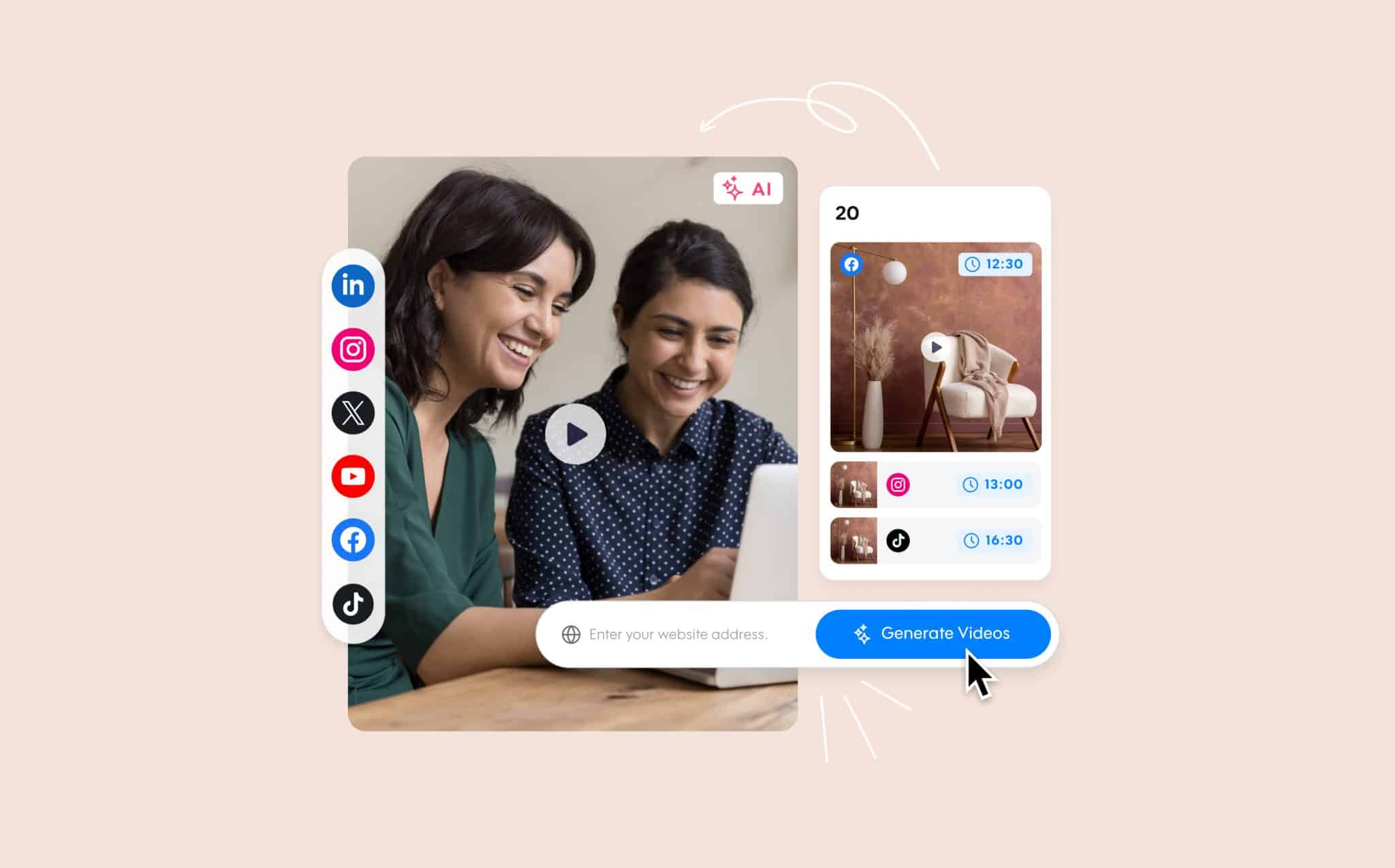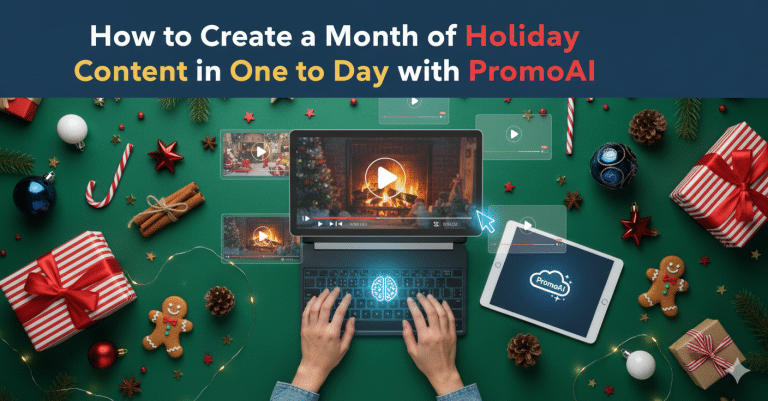
Master AI Marketing in 2024: Strategies for Small Businesses

- Blog
- Small Business Tips
- Master AI Marketing in 2024: Strategies for Small Businesses
With 61.4% of small business marketers already leveraging AI for activities such as content creation, social media management, and email marketing, it’s clear that what was now a fancy new tool has turned into an essential. And it’s easy to see why: 60% of small businesses using AI or automation have experienced significant time savings and enhanced work efficiency, and an overwhelming 91% of small businesses employing AI technology affirm that it has directly contributed to their success, particularly in marketing domains.
In this blog, we’ll dive into the role of AI in transforming marketing strategies for small businesses. From creating content to automating mundane tasks to generating profound insights and predictions, AI empowers small businesses to not only survive but thrive in today’s competitive market by working smarter, not harder. Let’s explore how integrating AI into marketing strategies is not just beneficial but essential for small businesses aiming to enhance their efficiency and improve their customer engagement.
AI in Marketing
Artificial intelligence in marketing seamlessly blends technology with traditional marketing strategies to revolutionize how businesses reach and engage their customers. At its core, AI marketing involves using tools and algorithms that can analyze data at an unprecedented scale to make automated decisions that are both efficient and effective.
Today, AI tools are more accessible than ever for small businesses, thanks to the proliferation of cloud-based solutions and AI-as-a-service platforms. These advancements mean that even businesses with limited technical expertise or resources can leverage powerful AI tools.
Implementing AI doesn’t necessarily require a hefty investment; many tools are scalable and subscription-based, allowing small businesses to pay for only what they need. This democratization of technology empowers small enterprises to compete on a level playing field with larger corporations, using data-driven insights to tailor their marketing strategies effectively.
Applications of AI in Marketing for Small Business
AI is a game-changer for small businesses, enabling them to leverage sophisticated marketing techniques that were once out of reach, due to cost or complexity. Below, we explore practical applications of AI in marketing for small businesses, demonstrating how these technologies can be used to enhance customer engagement, optimize marketing campaigns, and ultimately drive growth.
Enhancing Customer Insights with AI
For small businesses, understanding the customer is pivotal to success. AI significantly amplifies this understanding by providing tools to delve deep into customer data and extract actionable insights.
- Customer Data Analysis: One of the most powerful applications of AI in marketing is the ability to sift through vast amounts of customer data—transactions, social media interactions, and even web browsing patterns—to identify underlying trends and preferences. AI tools employ sophisticated algorithms to segment customers into meaningful groups based on their behavior and preferences. This segmentation allows businesses to tailor their offerings and communications in a way that resonates deeply with each segment, enhancing customer satisfaction and loyalty.
- Behavioral Predictions: AI doesn’t just analyze the past; it predicts the future. By leveraging machine learning algorithms, AI can forecast future customer behaviors with a remarkable degree of accuracy. This capability extends from predicting which products a customer might buy next, to forecasting the best times for sending marketing emails. These predictions help small businesses optimize their marketing efforts, ensuring they target the right customer with the right message at the right time, thus maximizing the impact of their marketing spend.
AI-Driven Content Creation
In the digital age, content is king, and with the integration of AI, small businesses can finally keep up with bigger brands. AI-driven content creation not only streamlines the process but also enhances the relevance and appeal of the content. Here’s how small businesses can leverage AI to transform their content strategies:
- Automated Content Generation: Generating fresh, appealing content consistently can be a daunting task, especially for small businesses with limited manpower. AI tools like PromoAI come to the rescue, producing text, images, and even video content in seconds. The heavy lifting of content generation done by AI frees up valuable time and resources that can be redirected toward more strategic activities.
- Content Personalization: AI excels in analyzing user data to understand individual preferences, browsing habits, and interaction history. This insight allows businesses to customize content for each user, ensuring that every piece of communication is relevant and engaging. Personalized content significantly boosts user engagement, as it resonates more deeply with the audience, fostering a stronger connection and loyalty to the brand. Whether it’s through personalized emails, tailored product recommendations, or dynamic website content, AI makes it possible to deliver a unique experience to each customer.
AI in Email Marketing
Email marketing remains a vital component of a small business’s marketing strategy, and AI is revolutionizing how these campaigns are executed to maximize effectiveness and engagement. By employing AI, small businesses can enhance their email marketing techniques, leading to higher open rates, better conversions, and a more personalized approach that resonates with recipients.
- Segmentation and Personalization: AI dramatically improves the precision of audience segmentation by analyzing customer data such as past purchase behavior, demographic information, and engagement levels. This granular segmentation allows for highly personalized email campaigns that speak directly to the interests and needs of each customer segment. Personalized emails, which may include tailored product recommendations, personalized offers, or content aligned with the user’s preferences, significantly outperform generic messages. This tailored approach not only boosts open rates but also enhances the chances of conversion, as recipients feel that the content specifically addresses their unique needs and interests.
- Optimization of Send Times: Timing can be just as crucial as content in email marketing. AI helps determine the optimal send times for each segment of your audience by analyzing when users are most likely to open and engage with emails. This involves understanding patterns in user activity across different times of the day and days of the week, tailoring email delivery to these insights. By ensuring that emails arrive in inboxes at the most opportune moments, small businesses can greatly increase the likelihood of engagement and action, rather than having their messages lost in a crowded inbox.
Social Media Marketing with AI
Social media is an essential channel for small businesses to connect with their audience, and AI technology is transforming how they manage these interactions and track their success. Through automated solutions and deep data analysis, AI empowers small businesses to optimize their social media strategies for maximum impact.
- Comprehensive Campaign Management: Tools like PromoAI streamline the entire social media marketing process, including planning, creating, scheduling, and posting to multiple platforms. This integration of AI allows small businesses to maintain a consistent and effective presence on social media, ensuring that all content is timely, relevant, and aligned with their marketing goals. This comprehensive approach not only saves time but also enhances the effectiveness of social media campaigns, making it easier for businesses to reach their target audience with the right message at the right time.
- Automated Customer Interactions: AI-powered chatbots are revolutionizing customer service on social media platforms. These bots can handle inquiries instantly, providing responses 24/7 without human intervention. They can manage multiple interactions at once, from answering frequently asked questions to assisting with purchases or booking services. This level of instantaneity not only enhances customer satisfaction by providing immediate assistance but also frees up human resources to handle more complex queries or tasks that require a personal touch.
- Social Media Analytics: Understanding the impact of social media activities is crucial for refining strategies and ensuring the best return on investment. AI tools excel in analyzing vast amounts of social media data to gauge the effectiveness of campaigns and identify emerging trends. They can track engagement metrics such as likes, shares, comments, and more, providing insights into what content works best and why. AI can also monitor consumer sentiment and feedback across social media channels, giving businesses a clearer understanding of public perception and the opportunity to adjust their strategies accordingly.
AI in Advertising
AI has become a cornerstone in modern advertising strategies, especially for small businesses looking to maximize their marketing budgets. AI enables more precise targeting and analysis, ensuring that advertising efforts are not only more efficient but also more effective.
- Targeted Advertisements: AI excels in creating and managing ad campaigns that reach the most relevant audience segments. By analyzing data from various sources — such as website visits, customer behavior, and social media interactions — AI can identify specific patterns and preferences. This information allows businesses to craft ads that are highly tailored to the interests of their target audience. Moreover, AI can manage ad placements in real-time, optimizing for factors such as user engagement and conversion rates, which significantly improves the cost-efficiency of ad spends. This targeted approach ensures that businesses are not wasting resources on broad, ineffective advertising, but are instead focusing on prospects most likely to convert.
- ROI Analysis: One of the biggest advantages of using AI in advertising is its ability to track and analyze the return on investment (ROI) across different marketing channels and campaigns. AI tools can automatically measure the performance of each ad, comparing costs against outcomes like sales and conversions. This data is invaluable for small businesses as it provides clear insights into which strategies are working and which are not, enabling them to allocate their budgets more effectively. Furthermore, AI-driven insights can predict future campaign performance based on historical data, helping businesses to continuously refine and improve their advertising strategies.
AI and Customer Relationship Management (CRM)
AI is reshaping Customer Relationship Management (CRM) systems, enabling small businesses to proactively manage customer interactions with a level of sophistication previously only available to large enterprises. By integrating AI, businesses can anticipate customer needs and refine their CRM strategies, thereby enhancing both customer satisfaction and retention.
- Predictive Customer Service: AI can transform customer service from reactive to proactive. By analyzing customer behavior, purchase history, and interaction data, AI can predict potential issues or inquiries and offer solutions before the customer even reaches out. For example, if a pattern shows that customers frequently encounter a specific issue after purchasing, AI can trigger an automated email that addresses this issue, providing troubleshooting tips or direct links to help resources. This not only enhances the customer experience by minimizing frustration but also reduces the workload on customer service teams.
- Enhanced CRM Data: AI significantly augments the data capabilities of CRM systems. It can analyze vast arrays of data points to uncover deep insights about customer preferences and behaviors. These insights can be used to segment customers more effectively, tailor marketing messages, and even predict future buying behaviors. Additionally, AI can continuously update and refine customer profiles based on new data, ensuring that the CRM system evolves and stays relevant over time. This dynamic approach allows small businesses to remain agile, adapting their strategies to meet the changing needs and expectations of their customers.
The Best Place to Start
For small businesses looking to dive into the transformative world of AI in marketing, knowing where to begin can often be the biggest hurdle. Fortunately, experiences from early adopters provide a clear roadmap.
According to a survey, small businesses find that the most accessible entry points for leveraging AI technology in marketing include social media, content creation, and analytics. These areas offer both manageable and significant impacts on marketing strategies, making them ideal starting points for those new to AI integration.
- Social Media: With its dynamic nature and the need for constant content updates, social media is as one of the most straightforward segments for integrating AI. Tools like PromoAI that automate posting schedules can drastically reduce the workload and improve the effectiveness of social media campaigns.
- Content Creation: Another area ripe for AI application is content creation. AI can assist in generating ideas, producing drafts, and even optimizing content for SEO. This not only speeds up the creation process but also ensures that the content is tailored to the preferences and behaviors of the target audience, increasing engagement and relevance.
- Analytics: Perhaps one of the most powerful applications of AI lies in analytics. AI tools can sift through massive datasets to extract meaningful insights about customer behavior, campaign performance, and market trends. This capability allows small businesses to make informed decisions, tailor their marketing strategies more effectively, and allocate resources where they are most likely to yield returns.
Starting with these areas can help small businesses gradually adapt to AI technologies without overwhelming their existing processes. By focusing on one or more of these aspects, small businesses can experience firsthand the benefits of AI, from increased efficiency to more personalized customer interactions, setting a solid foundation for more advanced AI implementations in the future.
The Future of Marketing for Small Businesses
As we’ve explored throughout this blog, the integration of AI into the marketing strategies of small businesses is not just a trend but a pivotal shift towards smarter, more effective marketing. AI’s capabilities—from analyzing customer data to automating content creation and optimizing email marketing campaigns—provide small businesses with the tools they need to compete in a digital-first world.
By harnessing the power of AI, small businesses can streamline their processes, create better content faster, tailor their marketing strategies to meet the unique needs of their customers, predict future trends, and allocate resources more efficiently. This not only maximizes ROI but also enhances the overall customer experience, creating a cycle of engagement and loyalty that drives continuous growth.
To get started with using AI to optimize your social media marketing strategy, try out PromoAI today.
Meet PromoAI
Generate a month worth of video content for your business in just one click!
About the author
Daisy Rogozinsky
Daisy Rogozinsky loves to use the written word to educate, entertain, and tell stories. If she's not writing content, she's writing poetry, music, and screenplays.


